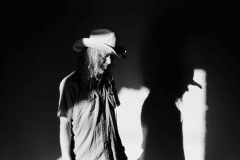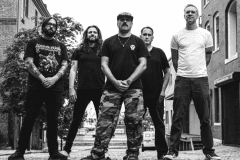What happens when an artist evolves? Not like, adding a pedal steel for some country flavor and hoping nobody notices you’re still Bon Jovi, but really evolves? There is an inherent danger of changing up the formula and possibly losing the plot, resulting in a sound that only peripherally resembles what created the audience in the first place. Change is inevitable, whether it’s the pop market changing with the trends or your favorite loner-slathered-in-corpsepaint one-dude-on-a-four-track black metal band. Growth is a natural part of life, allowing for new avenues of expression and new emotions to convey, for better or worse. So what happens when a band shifts musical gears?
Well, if you’re a die-hard of the doom-laden ‘90s Peaceville version of Anathema, the answer is scream “SELLOUTS!” into the vacuous void of the internet, bashing your face into the keys with each successive rant. Anathema provides the very definition of a case study in a band evolving beyond anyone’s wildest imagination. It is very true that a rather seismic shift occurred around 2001’s A Fine Day To Exit. A complete departure? No, but the newfound textures and the addition of the vocals of Lee Douglas certainly hinted at a shedding of genre restrictions and a willingness to explore beyond. Change is unavoidable.
“People have been saying we’ve gone soft for so long now it makes us laugh,“ everything-ist Danny Cavanagh says, indeed laughing. “It’s the emotional resonance, with the heart and the mind. There’s nothing wrong with being a metalhead, they’re great, and you meet loads of open-minded metalheads. You meet loads of them that aren’t so open, too, but metalheads are great. We were always more open. It was a mix of things, as much the songwriting of Duncan as our love for old rock bands like Pink Floyd and The Beatles. It was a reflection of the kind of people that we were, the kind of people that we are. We didn’t write music like The Beatles, but they were a key influence on our mentality and they always moved forward.”
If the early 2000s shift caused consternation amongst the die-hards, the explosive growth exhibited from 2010’s masterpiece We’re Here Because We’re Here onward has certainly resulted in mountains of keyboards, crushed beyond use and covered in a sheen of rage-spittle, born witness to the ravings of ‘ultimate betrayal’. True, gone were the goth-tinged dirges of yore, replaced with a more positive strain of progressive rock that focused on keyboards and the now-integral vocals of Lee Douglas to get their point across. Again, growth is inevitable, but one need only look at “Springfield”, off of their stellar new release The Optimist, to see that hasn’t lost any of the core that has given their music its emotional heft over the years. They’ve just discovered new ways of conveying a collective definition of ‘heavy’ as filtered through the six individuals that comprise Anathema.
“When heavy music is fantastic, when something is really heavy and done the right way, there’s nothing else in the world that does that, you know?” Cavanagh says. “It’s the best way of describing aggressive emotions, and there is a place for that. It’s just that we also love other stuff, and it’s a case of merging that heaviness with other things. People think we’ve gone soft, but we haven’t, we’ve just expanded, and obviously, most of the songs aren’t like that anymore, but some of them are still as heavy. A piano line and vocals can be far more devastating than seven string guitars and massive amplifiers. There has to be a balance, a mix. We know it doesn’t matter what anyone says, though, because what we do comes from a place of honesty.”
Anathema’s forward progression shows no signs of letting up with The Optimist, the electronic flourishes a natural outgrowth, the addition of trombone comfortably nestled against the powerful guitars and cinematic strings that have become a trademark.
“Well, in 2012 John and Vincent wanted to start incorporating electronica into it, and I just wasn’t ready then. I was much more into the classical thing, influenced by strings and textures and all of that. One difference is that we had more demo time, so the songs were built from the ground up. I started to let that electronic feel in a bit more, and this one is just a natural progression. When I put down a piano progression, it was very easy for them to pull it up on their computers and build on it with drum machines and such, so it became just as natural a progression to us as plugging in a guitar. The trombone is much the same. The idea’s been around for quite a while, we just never got around to a song where it jumped out, you know? Tony Doogin, the producer, loves soundtracks and played Taxi Driver right before the trombone player arrived, and my idea for the trombone line coupled with hearing that soundtrack is where that came from, that clustered chord.”
The Optimist continues the band’s penchant for forward-thinking progressive rock, but the narrative finds the band returning to the epicenter of dissension, utilizing A Fine Day To Exit as its thematic jumping-off point. “There’s a story and narrative to it, sure. It’s set on the West Coast, in San Diego where A Fine Day to Exit was made. The first song title is the coordinates of where that photo was taken, and the track is the sound of our Optimist getting back in a car and driving away, suggesting a journey. Where is he going? Why is he running away? From what?”
Lest we lose the concept-phobic crowd, Anathema is way too smart to pin things down to one perception. Although the album adheres to one narrative perfectly, from claustrophobic opener “Leaving It Behind” to the wide-open string-drenched majesty of closer “Back To The Start”, it is also very much possible to fully immerse yourself in each individually without fear of losing any of the song’s power.
“Yeah, you can put in as much of the story as you want, we just give you suggestions, song titles and artwork that suggest a story, the rest is down to you,” Cavanagh says. “The lyrics to Springfield are simple, aren’t they? ‘How did I get here? I don’t belong here’. In the story, our Optimist has left San Francisco and found himself in a quiet town, in the middle of the night, in the rain, realizing that he doesn’t know anybody and maybe this journey isn’t quite as optimistic as he thought it was.
“It’s a simple song on the surface, one riff and a couple of words. But it’s actually not that simple at all,” he goes on. “When I wrote that song, I was in a difficult space, a bit of a hard time, I would get these moments of feeling lost, but they would pass and I’d feel okay again. And that’s the trick, isn’t it? Striking a balance between specifics and universals. The songs are absolutely about this character, we chose to dress them in story and put them into this context, but they are in fact, as they always have been, about our lives and thoughts and fears as well. It’s a simple song with one riff and a simple lyric, but you can read into that very deeply on any level that you choose to. So yes, there is a suggestion of story, but we don’t say how it ends, that’s up to you.”
As The Optimist more than capably shows, Anathema have learned ‘the trick’, shedding their goth-tinged doom roots in favor of a sweepingly cinematic progressive direction without losing one bit of the emotional heft that has always made their music so relatable and full of feeling. It’s very easy to feel betrayed by an artist’s change, to feel that as fans we should have some say in our favorite group’s output because change is hard. In light of the powerful arc of growth inherent in Anathema’s discography, some could also very convincingly argue necessary.
Words: Andrew Lampela
Website | Facebook | Twitter







Social Media